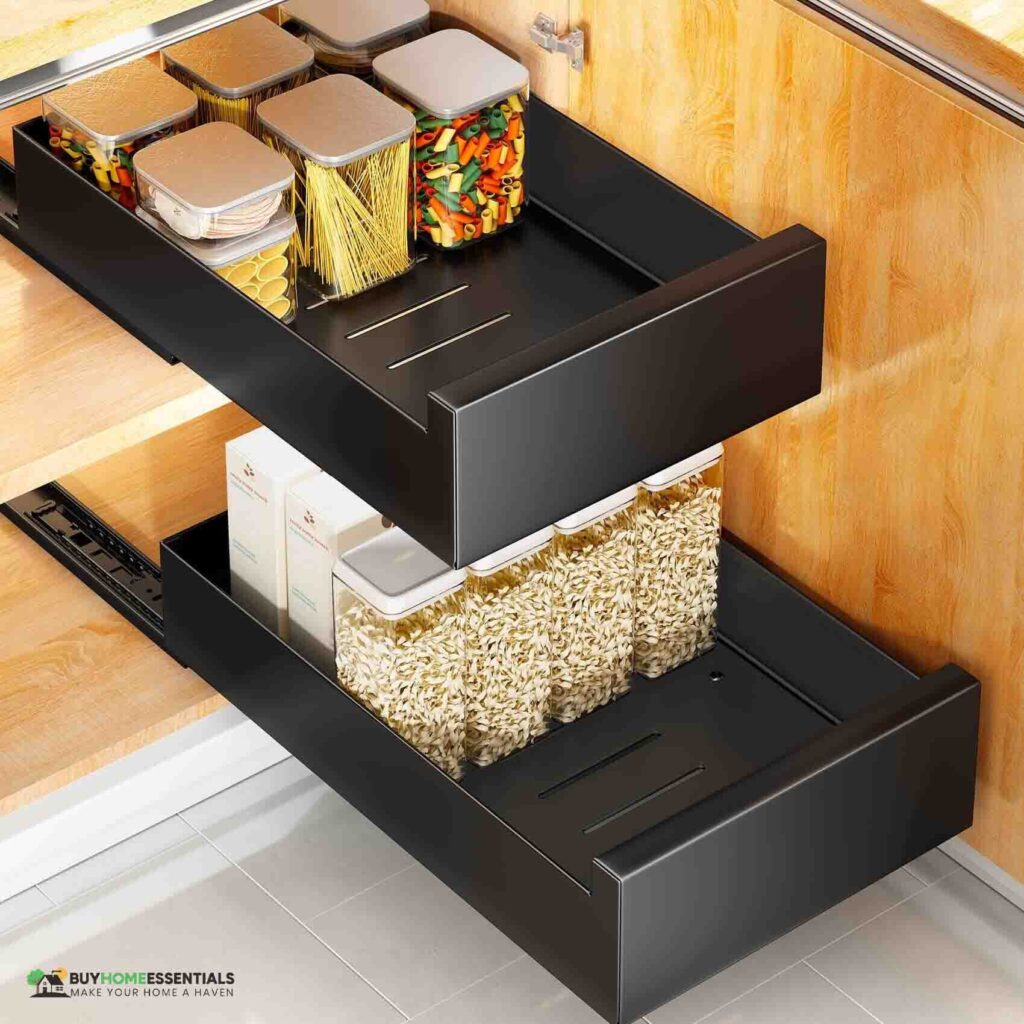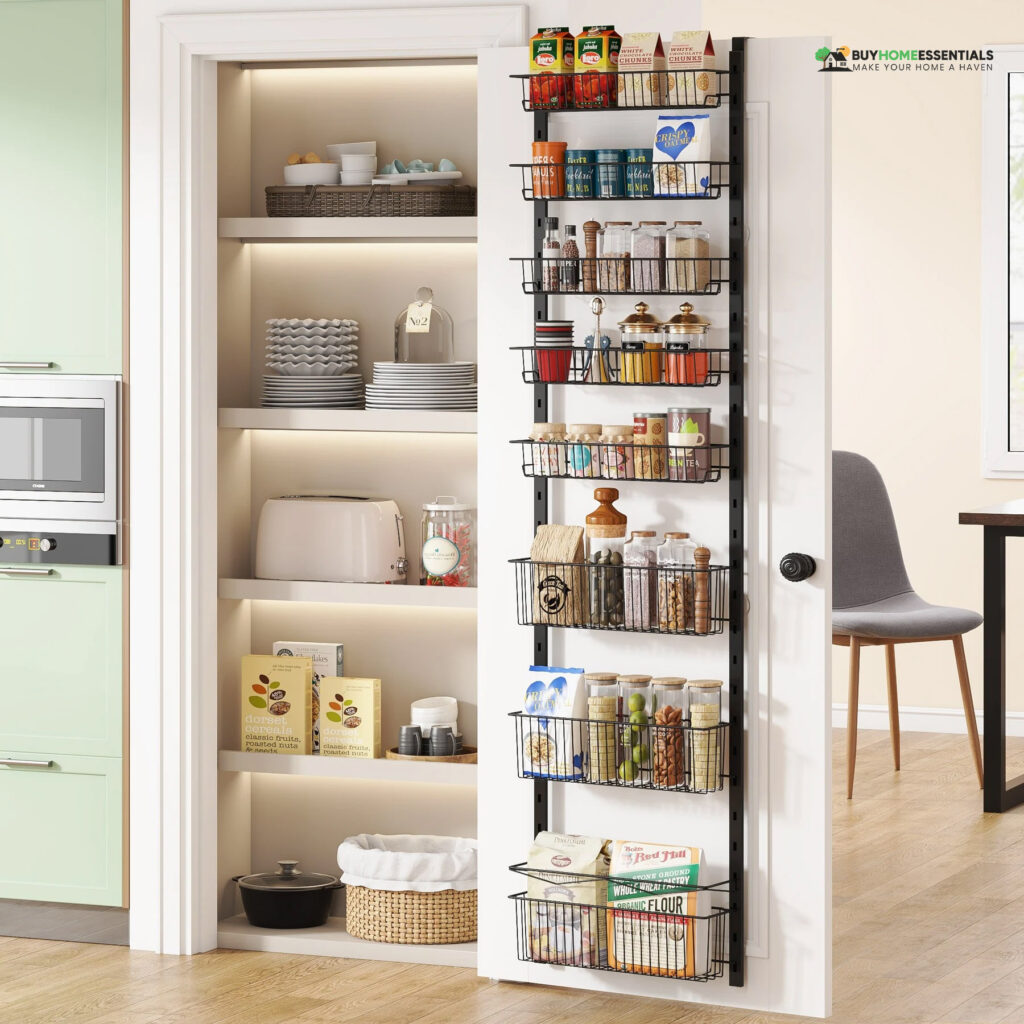A well-organized pantry is the cornerstone of an efficient kitchen, but the task can feel daunting when dealing with deep shelves. However, when faced with deep shelves, organizing a pantry becomes even more challenging. Deep recesses can become a mess when there’s no room for storage, making it hard to find things. Therefore this post will shed some light on how to organize a pantry with deep shelves.
You can easily organize a pantry with deep shelves with the right strategies and a bit of planning. Here we will walk you through assessing your pantry, choosing storage solutions, and implementing organized strategies. As a result, you will have the best-organized pantry and ideas to keep it that way. Let’s get started.
How to Organize a Pantry With Deep Shelves
There are some great ways to organize deep pantry shelves for the kitchen. Such as:
1. Prep Your Pantry for Organization
Organizing deep pantry shelves requires a fresh start before you get started. The first step is to empty your pantry shelves completely. Yes, everything. You can arrange it all on the table or counter in your kitchen. As you do so, check each item’s expiration date and state of condition. Immediately dispose of any items past their prime or that you will not use.
There are two purposes to this purging process. Firstly, it frees up valuable space for items you actually use and need. Additionally, it allows you to take stock of what you have and might need replacing.
By decluttering your pantry, you’ll have a clearer picture of what you have. In the end, you’ll be able to create an organized deep pantry shelves that suits your needs with a pared-down collection.
2. Categorize Items
Now that the pantry has been cleared of clutter, it’s time to organize it by categorizing the products. Categorizing is essential for creating a functional and organized space. It not only helps you to find what you need, but also prevents the accumulation of clutter in the future.
Start by brainstorming the items you normally keep in your pantry. Grains, canned goods, snacks, spices, baking supplies, and condiments are some of the most common categories. Put these items in groups based on how you use them in your cooking routine.

Use clear containers or bins for smaller items like spices, tea bags, or snack packs. You can easily see the contents using transparent containers, eliminating the need to rummage through shelves.
3. Stack Items in Height Order
Another effective technique for organizing deep pantry shelves is stacking Items by height. This method allows you to maximize vertical space and easily see and access all your pantry staples. Stack your items expertly to make the most of your pantry’s space. Tips to follow:
- Sort your pantry items by size first. Put more oversized items, like cereal boxes or jars, in one group, and smaller items, like spice bottles or small cans, in another.
- Place the taller items on the back of the shelf and the shorter ones on the front. This staggered arrangement allows you to see and access all items without rearranging them.
The height order stacking technique creates a well-organized pantry that looks tidy and functions well.
4. Utilize Shelf Organizers
It’s time to organize your pantry items using various shelf organizers now that you’ve categorized them. These tools are designed to maximize vertical space, provide easy access to items at the back, and maintain an organized layout. Here’s how you can make the most of these helpful solutions:
Tiered Shelves and Risers: It is easy to create multiple levels within a single shelf with tiered shelves and risers. They are especially useful for jars, canned goods, and smaller items. By utilizing vertical space, you can see and reach items that might otherwise be hidden.

Pull-Out Drawers: Install pull-out drawers in some of your deeper pantry shelves. These drawers allow you to slide out the entire drawer to reach items stored in the back. They’re perfect for storing snacks, chips, and even kitchen appliances.

Over-the-Door Organizers: You shouldn’t overlook the back of the pantry door! Over-the-door organizers can hold items like spices, small snacks, or even cleaning supplies. You can make use of this unused space as a valuable storage facility.
Customizable Shelving: You can adjust the height of each shelf in adjustable shelving units according to your needs. In addition to accommodating items of different sizes, this flexibility prevents wasted vertical space.
The shelf organizers will help you maximize the space in your deep pantry shelves.
5. Label Everything for Easy Access

Labeling your deep pantry shelve items is essential to organize them. They’re simple tools that help keep everything in order and organized. You can find what you need faster and encourage others to keep the pantry organized by labeling items. Here’s how to make labeling work effectively for your deep pantry shelves:
- Clear and Consistent Labels: Choose a labeling method that suits your style and is easy to read. A label maker, chalkboard, or even adhesive labels are all viable options. Keep your pantry’s labels legible and consistent.
- Label by Category: Label each shelf, container, or bin with its relevant category name. In this way, you can return items to their designated places without much effort.
- Expiration Dates: You should label items with expiration dates if they don’t already have them. As a result, your pantry’s organization is more visible.
- Color Coding: Add an additional layer of organization by using color coding. Assign different colors to different categories or zones in your pantry. The visual cues help you identify each type of item quickly.
6. Consider Bulk Storage Options
Bulk purchases often result in significant savings over smaller packaged items. It’s an excellent approach for pantry staples like rice, pasta, nuts, and dried fruits. When you invest in larger quantities, you can reap long-term financial benefits.
It is essential to use airtight containers when working with bulk items. The containers keep ingredients fresh, protect them from pests, and maintain their quality over time. Putting bulk goods into clear containers makes it easy to see when to restock.
In addition to keeping your ingredients fresh, airtight containers add uniformity to your pantry. Keeping flour, sugar, and grains in matching containers makes them look tidier. Besides that, these containers help create an organized system where you can find items quickly.
7. Keep Heavier Items on Lower Shelves
You should also consider the weight and stability of the items you store when organizing your deep pantry shelves. One smart strategy is to reserve the lower shelves of your pantry for heavier items. Additionally, this practice improves your pantry’s safety and makes it more organized.
Heavy items, such as canned goods and grain bags, tend to weigh more than lighter items. Putting them on the lower shelves minimizes the risk of shelves becoming unbalanced or things falling out.
Accessing frequently used heavy items is easier if they are stored below waist level. Thus, when retrieving heavy items, you won’t have to strain yourself or risk dropping them.
Related: How to Organize Kitchen Cabinets
8. Store Rarely-Used Items on Higher Shelves
Another key approach to organizing deep pantry shelves is to put rarely-used things on top. Keep your pantry organized and efficient by keeping the upper shelves for items you don’t use often. Best tips to follow:
- Keep track of items you use less frequently, like specialty ingredients, baking supplies, or seasonal items.
- Store these lesser-used items on the upper shelves of your pantry. It optimizes space and makes it easier to access your daily essentials.
- Whenever possible, store spill-prone or sensitive items in clear, airtight containers. In this way, you can preserve their freshness and easily spot them in the future.
9. Regular Maintenance
It’s important to remember that maintenance is the key to clutter-free and functional deep pantry shelves. Maintaining your pantry ensures it remains a hub for meal preparation for a long time. Keep your newly organized pantry in tip-top shape with these tips:
- Plan regular decluttering sessions so items don’t pile up and clutter your shelves. Keep your pantry clean and organized by removing expired or unused items.
- Verify that the labels still read well and reflect the contents accurately.
- During daily use, items might have been moved around. You should spend a few minutes restoring your height order stacking and zone arrangements.
Regular checks and periodic reorganization will keep your pantry a functional and pleasant space.
Read More: How to Decorate the Kitchen Counter
The Takeaway
That’s all from today’s round-up on how to organize a pantry with deep shelves. With strategic categorization, efficient stacking, and thoughtful maintenance, your deep pantry has become an organized haven.
Organizing your pantry saves you time, cuts waste, and enhances your culinary journey. Your cooking routine is more efficient with every intentional choice you make. Enjoy the efficiency and beauty of a well-organized pantry as you savor the joy of efficient cooking.





